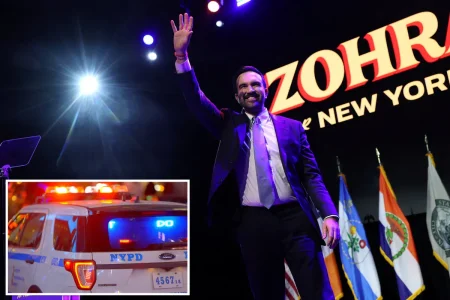Brooklyn Assemblywoman Causes Stir by Supporting Republican Mayoral Candidate
Democratic Brooklyn Assemblywoman Jamie Williams has sparked controversy within her party by publicly supporting Republican mayoral candidate Curtis Sliwa, while simultaneously criticizing former Governor Andrew Cuomo’s political comeback attempt. At the September 14 opening of Sliwa’s campaign office on Flatbush Avenue, Williams enthusiastically endorsed the Republican hopeful as the ideal candidate for her constituents. “Curtis has stood with our community from day one for everything the former governor, Andrew Cuomo, did to us, and also Eric Adams,” Williams declared in a video obtained by The Post. Representing the 59th District since 2016—encompassing Canarsie, Flatlands, Georgetown, Bergen Beach, Mill Basin, Mill Island, and Gerritsen Beach—Williams praised Sliwa as “the people’s mayor…who is going to fight for you.” This endorsement has created significant tension within Democratic circles, particularly because Williams is an elected Democrat who caucuses with the party in Albany.
The alliance between Williams and Sliwa appears to be rooted in shared opposition to several initiatives affecting southern Brooklyn. Both have stood against the migrant encampment at Floyd Bennett Field, certain homeless shelters, and battery storage facilities in the predominantly moderate and conservative neighborhoods of single and two-family homeowners. Sliwa has also distinguished himself by opposing congestion pricing and increased housing density in southern Brooklyn—positions that align with many constituents in Williams’ district. At the campaign office opening, Williams specifically commended the Guardian Angels, the volunteer patrol group founded by Sliwa recognizable by their red berets and jackets. “We need someone we can trust, not someone who is recycled with their bad behavior and their bad actors,” Williams stated, contrasting Sliwa with his opponents. “With Curtis we have someone who is going to represent the community, our people and every single New Yorker.”
Williams’ public support for Sliwa prompted immediate backlash from Democratic activists. The newly formed Canarsie Democracy Club issued an open letter criticizing her actions. “As someone elected in the Democratic primary and caucuses with the Democratic Party in Albany, your decision to openly support a Republican candidate raises serious concerns,” wrote club co-founder Aissata Diallo. The letter questioned how Williams’ endorsement serves her constituents and aligns with the commitments she made when seeking office. Diallo cited New York State Democratic Party rules, which state that individuals holding or seeking office under the Democratic Party label commit “not to oppose publicly the election of any Democratic nominee for the office in New York State.” The letter argued that Williams’ endorsement violated this rule and undermined both the Democratic nominee and broader party efforts to serve their communities. Diallo further suggested that this action could compromise Williams’ credibility and influence within the caucus she relies on for district resources.
When questioned by The Post after the controversy erupted, Williams attempted to downplay her remarks, claiming they did not constitute an official endorsement. “Curtis showed up for me. I supported him back. It’s the respectful thing to do,” she explained. “At the end of the day, it’s about doing the right thing.” Despite video evidence of her enthusiastic support at Sliwa’s campaign event, Williams insisted, “I did not endorse anyone.” She described herself as a “conservative Democrat” and explained that supporting the Democratic nominee, Zohran Mamdani, whom she characterized as a radical left-wing candidate, was out of the question for her. While acknowledging Mamdani as a hard-working colleague from their time together in the Assembly, Williams stated bluntly, “I will not support a socialist agenda.” She also pointed out that state Democratic Party Chairman Jay Jacobs had similarly declined to support the Queens assemblyman, suggesting her position was not without precedent within the party leadership.
Williams’ political calculus reflects the complex dynamics of her district. She receives backing from Republicans and conservatives in addition to Democrats, and emphasized that her decisions are ultimately about representing the voters who elected her. “At the end of the day it’s about the people who elected me,” Williams stated, framing her support for Sliwa as being responsive to constituent interests rather than party loyalty. The unusual mayoral race includes not only Sliwa and Democratic nominee Mamdani but also former Governor Cuomo running on an independent line. Until recently, incumbent Mayor Eric Adams was also in the race on an independent line before suspending his campaign. This fragmented field has created unusual political alignments, with Williams positioning herself against both Mamdani’s progressive agenda and Cuomo’s comeback attempt.
Interestingly, Brooklyn Democratic Party chairwoman Rodneyse Bichotte, who is backing Mamdani after his primary victory over Cuomo, has not publicly criticized Williams for her actions. A spokesperson for Bichotte indicated that the party leader did not consider Williams’ pro-Sliwa speech to constitute an endorsement—a position that may help avoid further intra-party conflict. Sliwa, however, had no such reservations about characterizing Williams’ support. He declared it was “absolutely an endorsement” and promised to reciprocate by “knock[ing] on doors” to help Williams should she face a Democratic primary challenge next year. This mutual support relationship across party lines illustrates the sometimes fluid nature of local politics, where personal relationships and specific issue alignments can occasionally transcend traditional party boundaries. As this situation unfolds, it highlights the tension between party discipline and the autonomy of elected officials to respond to what they perceive as the specific needs and preferences of their constituents.











